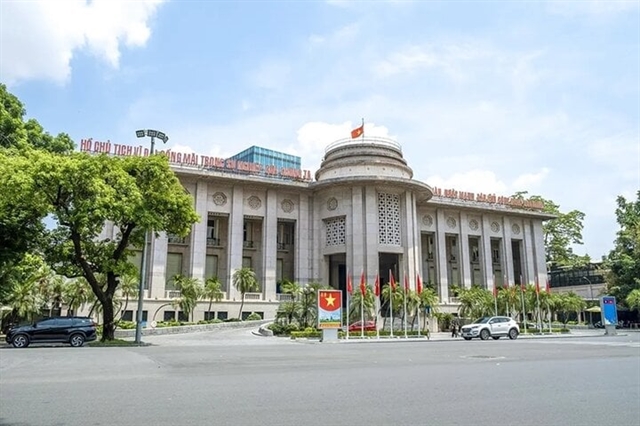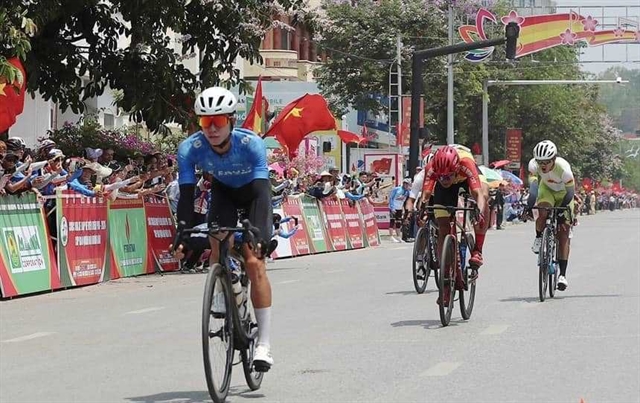 Economy
Economy


|
| The State Bank of Việt Nam headquarters. The bank suggests the Government to issue a decree on credit policy for agricultural and rural development. — Photo vtcnews.vn |
HÀ NỘI — The State Bank of Việt Nam (SBV) continues to strengthen review of regulations on lending activities to remove obstacles in accessing capital at banks for the collective economic sector and cooperatives.
The bank also proposes the Government allow rescheduling of debt payment and the maintenance of debt groups until December 31, 2024 according to Circular 02/2023/TT-NHNN. That will help customers facing difficulties in all industries and sectors, including the collective economic sector, said Phạm Thị Thanh Tùng, deputy head of SBV's Department of Credit for Economic Sectors.
In addition, the bank suggests the Government issue a decree on credit policy for agricultural and rural development.
Tùng informed that besides commercial banks' preferential policies, cooperatives and cooperative members now take preferential loans from 28 credit programmes of the Bank for Social Policies.
According to Tùng, the State Bank has already directed credit institutions to synchronously implement solutions on removing difficulties and obstacles related to borrowing conditions and procedures, reduce loan interest rates and waive service fees.
The bank has improved the efficiency of appraisal and credit rating for customers to increase lending without collateral. It has applied loan security mechanisms in a flexible manner, and diversified credit programmes and products.
Đặng Văn Thành, deputy head of the Department of Cooperative Economics, Ministry of Planning and Investment, said that as of the end of 2023, Việt Nam had 30,698 cooperatives, 137 cooperatives' unions and 71,500 cooperative groups.
According to Thành, there are many policies to support the development of the collective economic sector and cooperatives, but few cooperatives have approached to the State's policies, especially supportive policies on credit and land.
Thành said that this is due to lack of appropriate criteria to getting loans for cooperatives, and complicated administrative procedures. Moreover, there is no specific mechanism on using the State budget for cooperatives.
Nguyễn Hữu Hạ, chairman cum director of Công Bằng Thuận An Cooperative, Đắk Nông Province, said strict bank lending regulations make it difficult for the cooperatives to access the capital.
Therefore, Hạ has proposed that the Government direct the State Bank, relevant ministries, and commercial banks to reduce administrative procedures for lending activities and prioritise lending to cooperatives with effective business.
In recent years, cooperatives have developed in both quantity and quality, Cao Xuân Thu Vân, chairwoman of the Việt Nam Cooperatives' Alliance said, but the collective economy and the cooperatives have not been developed as expected.
Especially, Vân said, a large number of individual households in the rural area have not joined cooperatives or cooperative groups, while many cooperatives have small scale operation with limited capital and management capacity, low membership links and no clear market brand.
The cooperatives have difficulties accessing capital for production and business mainly due to not meeting the borrowing conditions.
Huỳnh Kim Định, deputy director of the Department of Economic Cooperation and Rural Development, Ministry of Agriculture and Rural Development, said about 80 credit institutions and nearly 1,200 people's credit funds nationwide now provide loans for the agriculture sector and rural areas.
According to the State Bank, by 2023, the outstanding loans of the agriculture and the rural area reached over VNĐ3.29 quadrillion, accounting for 24.29 per cent of the economy's total outstanding loans.
Tùng from the State Bank said that by the end of February 2024, total outstanding loans of cooperatives and cooperatives' alliances reached more than VNĐ6 trillion, down 1.68 per cent compared to the end of 2023. Of this, credit for cooperatives in the agricultural sector accounted for 17.4 per cent.
About 53 per cent of the outstanding loans were to cooperatives in the industrial and construction sector, while credit for cooperatives in the trade and service sector accounted for 29.6 per cent.
The outstanding loans for cooperatives and cooperatives' alliances were mainly concentrated in state-owned commercial banks, accounting for 79 per cent. — VNS




